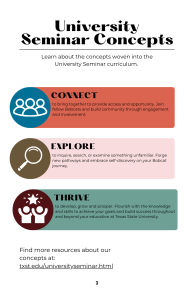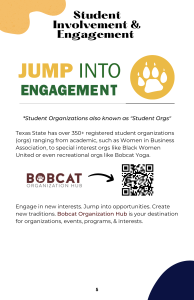1
How to Navigate Your Planner

University Terminology
University Seminar Concepts

Transition to College
College is the time for a lot of firsts.
Transitioning to or from a college or university brings new experiences and responsibilities for students entering this exciting phase of life. It marks a time of independence, where you have opportunities to navigate to adulthood. While being away from friends and family may initially feel overwhelming, you can maintain relationships even at a distance. The balance between staying connected and focusing on academics becomes essential as the semester progresses.
Embracing newfound independence means taking charge of your actions and decisions for managing and establishing a routine. Meeting new people, who are experiencing similar situations, can help with the loneliness and anxiety of being away from everything that is familiar.
Get out and meet your classmates or someone that has similar interests. Effective planning and relationship-building are crucial skills to attain now.
Navigation through college is a transformative journey where personal growth and academic achievements go hand in hand. By finding the right balance between maintaining relationships, embracing independence, and staying organized, you can create a fulfilling and successful college experience.
Student Involvement & Engagement


A student whose parents/guardian(s) did not earn a degree from a four-year college or university in the United States.
The first university degree a student is studying.
when a student is pursuing a Master’s or Doctorate degree.
A professional who provides guidance on course enrollment, academic progress and policies, and graduation. be sure to meet with your advisor every semester.
an individual or an office who oversees your academic record at the university.
A document that describes important information about a course. It may include items such as office hours, required books or learning materials, assignments, due dates, grading scale, expectations, procedures, and policies.
unenrolling in a course you are concerned you may get an 'f'. Dropping a class before a certain deadline will give you a 'w'.
A course that must be completed before taking another course
faculty are available in their office to meet with students at least once a week. you are encouraged to visit with the faculty member often.
how well a student is academically performing. calculate a gpa by dividing the number of grade point by credit hours completed. A = 4 points, a B = 3 points, a C = 2 points, a D = 1 point, and an F = 0 points.
When a student drops all courses they are enrolled in for a semester.
The number of hours assigned to a course, which often reflects the approximate time spent in class per week. Many classes are three credit hours, which means they meet three times a week for 50 minutes, or two times a week for 75 minutes. you need 120 hours to graduate.
TXST’s online learning management system where you will find your course materials, monitor course grades, and submit course assignments.
free money that you do not have to pay back. It is mostly based on financial need.
Free money based on your academic performance.
free money that students do not need to pay back. Scholarships can be internal or external to the university.
A Person who has earned college credit hours after high school and then switched to another institution.
the government will pay the interest until you enter repayment period.
the Interest starts building up the day the loan is taken out; it is not based on financial need.
